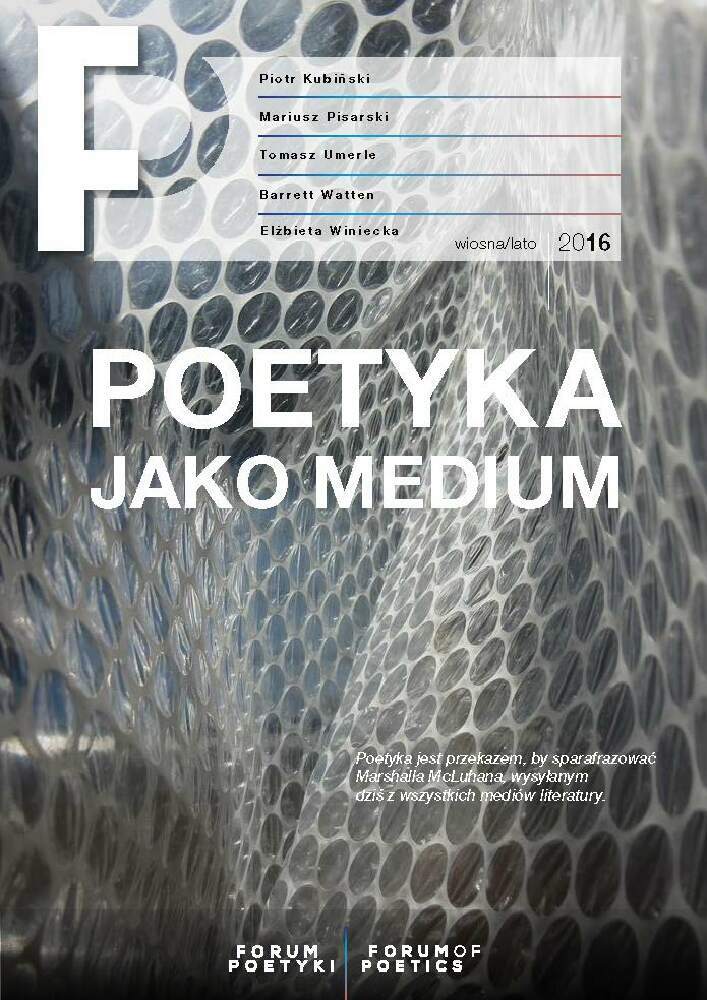Abstract
The author of the article presents the current situation and perspectives for future development of literary scholarship relating to the changing media environment and the development of new forms of writing activity on the Internet. She looks for answers to the question of where the borders of literariness online lie and how it is defined. The author further presents the current state of literary scholarship on the subject of the transformation of literature under the influence of digital media and related problems. The author cites a concept developed by Sandy Baldwin, who in the book Internet Unconsious (2015) shows new potential areas of study relating to these phenomena, demonstrating conclusively that this new interactive medium not only poses no threat to literature, but constitutes a natural area for its expansion. This calls for readiness on the part of literary scholars to embrace new theoretical and technological solutions.
References
„Andromeda”. Udostępniono 1 czerwiec 2020. http://collection.eliterature.org/2/works/fisher_andromeda.html.
Baldwin, Sandy. The Internet Unconscious: On the Subject of Electronic Literature. Nowy Jork-Londyn, 2015.
Carr, Nicholas G. Płytki umysł. Jak internet wpływa na nasz mózg. Gliwice, 2013.
Celiński, Piotr. Postmedia: cyfrowy kod i bazy danych. Lublin, 2013.
Flusser, Vilém. „Społeczeństwo alfanumeryczne”. Przetłumaczone przez A. Kopacki. Lettre Internationale, 1994 1993.
Gardenfors, Peter, i Petter Johansson. Cognition, Education, and Communication Technology. London, 2005.
Gwóźdź, Andrzej. „Posłowie”. W Ekrany piśmienności: [o przyjemnościach tekstu w epoce nowych mediów. Warszawa, 2008.
Gwóźdź, Andrzej. „Retoryka sieci: hiperlektura oraz krytyczny poziom piśmienności”. W Ekrany piśmienności: [o przyjemnościach tekstu w epoce nowych mediów. Warszawa, 2008.
Hayles, Katherine. How We Think: Digital Media and Contemporary Technogenesis. Chicago, 2012. http://www.myilibrary.com?id=355452.
Hayles, Nancy Katherine. Electronic Literature: New Horizons for the Literary. Notre Dame, 2008.
Izdebska, Agnieszka, i Danuta Szajnert, red. Literatura prze-pisana: od Hamleta do slashu, 2015.
Izdebska, Agnieszka, Danuta Szajnert, i Ewa Szczęsna, red. „Cyfrowe parafrazy. O niedokładnym przepisywaniu kultury”. W Literatura prze-pisana: od Hamleta do slashu, 2015.
McLuhan, Marshall. Zrozumieć media: przedłużenia człowieka. Przetłumaczone przez Natalia Szczucka-Kubisz. Warszawa, 2004.
Szczęsna, Ewa. „Cyfrowe parafrazy: o niedokładnym przepisywaniu kultury (przyczynek do tematu)”. Literatura prze-pisana : od Hamleta do slashu, 2015, 11–24.
Szczęsna, Ewa. „Znak digitalny. U podstaw nowej semiotyki tekstu”. W Przekaz digitalny: z zagadnień semiotyki, semantyki i komunikacji cyfrowej, zredagowane przez Ewa Szczęsna. Kraków, 2015.
Zawojski, Piotr. Cyberkultura. Syntopia szuki, nauki i technologii. Katowice, 2010
License
Authors of articles are responsible for securing the rights to other publications (texts, tables, drawings and other illustrations) quoted or reproduced in their texts.

